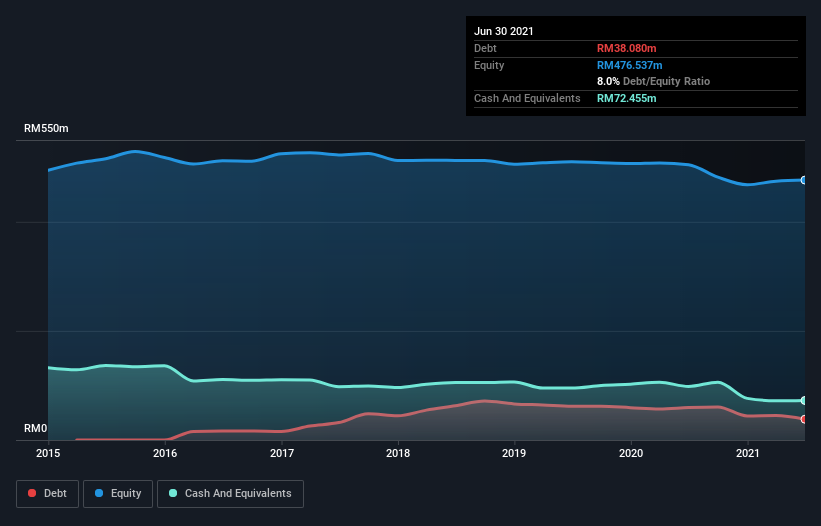GUH Holdings Berhad (KLSE:GUH) Has Debt But No Earnings; Should You Worry?
David Iben put it well when he said, 'Volatility is not a risk we care about. What we care about is avoiding the permanent loss of capital.' So it might be obvious that you need to consider debt, when you think about how risky any given stock is, because too much debt can sink a company. Importantly, GUH Holdings Berhad (KLSE:GUH) does carry debt. But the real question is whether this debt is making the company risky.
When Is Debt Dangerous?
Debt assists a business until the business has trouble paying it off, either with new capital or with free cash flow. Part and parcel of capitalism is the process of 'creative destruction' where failed businesses are mercilessly liquidated by their bankers. However, a more usual (but still expensive) situation is where a company must dilute shareholders at a cheap share price simply to get debt under control. Of course, plenty of companies use debt to fund growth, without any negative consequences. The first thing to do when considering how much debt a business uses is to look at its cash and debt together.
Check out our latest analysis for GUH Holdings Berhad
How Much Debt Does GUH Holdings Berhad Carry?
As you can see below, GUH Holdings Berhad had RM38.1m of debt at June 2021, down from RM59.5m a year prior. But it also has RM72.5m in cash to offset that, meaning it has RM34.4m net cash.

A Look At GUH Holdings Berhad's Liabilities
Zooming in on the latest balance sheet data, we can see that GUH Holdings Berhad had liabilities of RM84.6m due within 12 months and liabilities of RM41.7m due beyond that. Offsetting this, it had RM72.5m in cash and RM61.7m in receivables that were due within 12 months. So it can boast RM7.90m more liquid assets than total liabilities.
This short term liquidity is a sign that GUH Holdings Berhad could probably pay off its debt with ease, as its balance sheet is far from stretched. Simply put, the fact that GUH Holdings Berhad has more cash than debt is arguably a good indication that it can manage its debt safely. There's no doubt that we learn most about debt from the balance sheet. But you can't view debt in total isolation; since GUH Holdings Berhad will need earnings to service that debt. So when considering debt, it's definitely worth looking at the earnings trend. Click here for an interactive snapshot.
Over 12 months, GUH Holdings Berhad made a loss at the EBIT level, and saw its revenue drop to RM258m, which is a fall of 7.1%. We would much prefer see growth.
So How Risky Is GUH Holdings Berhad?
While GUH Holdings Berhad lost money on an earnings before interest and tax (EBIT) level, it actually generated positive free cash flow RM2.8m. So taking that on face value, and considering the net cash situation, we don't think that the stock is too risky in the near term. With mediocre revenue growth in the last year, we're don't find the investment opportunity particularly compelling. There's no doubt that we learn most about debt from the balance sheet. But ultimately, every company can contain risks that exist outside of the balance sheet. To that end, you should learn about the 3 warning signs we've spotted with GUH Holdings Berhad (including 1 which is concerning) .
If, after all that, you're more interested in a fast growing company with a rock-solid balance sheet, then check out our list of net cash growth stocks without delay.
New: Manage All Your Stock Portfolios in One Place
We've created the ultimate portfolio companion for stock investors, and it's free.
• Connect an unlimited number of Portfolios and see your total in one currency
• Be alerted to new Warning Signs or Risks via email or mobile
• Track the Fair Value of your stocks
This article by Simply Wall St is general in nature. We provide commentary based on historical data and analyst forecasts only using an unbiased methodology and our articles are not intended to be financial advice. It does not constitute a recommendation to buy or sell any stock, and does not take account of your objectives, or your financial situation. We aim to bring you long-term focused analysis driven by fundamental data. Note that our analysis may not factor in the latest price-sensitive company announcements or qualitative material. Simply Wall St has no position in any stocks mentioned.
Have feedback on this article? Concerned about the content? Get in touch with us directly. Alternatively, email editorial-team (at) simplywallst.com.
About KLSE:GUH
GUH Holdings Berhad
An investment holding company, engages in the electronic, property development, and utilities businesses in Malaysia, China, Indonesia, Singapore, and internationally.
Excellent balance sheet and slightly overvalued.
Market Insights
Weekly Picks


Crazy Undervalued 42 Baggers Silver Play (Active & Running Mine)


Fiducian: Compliance Clouds or Value Opportunity?

Willamette Valley Vineyards (WVVI): Not-So-Great Value
Recently Updated Narratives

TXT will see revenue grow 26% with a profit margin boost of almost 40%

Significantly undervalued gold explorer in Timmins, finally getting traction

Moderation and Stabilisation: HOLD: Fair Price based on a 4-year Cycle is $12.08
Popular Narratives


MicroVision will explode future revenue by 380.37% with a vision towards success


NVDA: Expanding AI Demand Will Drive Major Data Center Investments Through 2026





